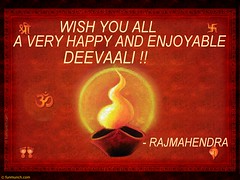30 October, 2005
25 October, 2005
DEVELOPED INDIA - Dr. APJ Abdul Kalam.
 DEVELOPED INDIA
DEVELOPED INDIADr. APJ Abdul Kalam.
The President of India
I have three visions for India.
In 3000 years of our history, people from all over the world have come and invaded us, captured our lands, conquered our minds. From Alexander onwards. The Greeks, the Turks, the Moguls, the Portuguese, the British, the French, the Dutch, all of them came and looted us, took over what was ours. Yet we have not done this to any other nation. We have not conquered anyone. We have not grabbed their land, their culture, their history and tried to enforce our way of life on them.
Why? Because we respect the freedom of others. That is why my first vision is
that of FREEDOM. I believe that India got its first vision of this in 1857, when we
started the war of independence. It is this freedom that we must protect and
nurture and build on. If we are not free, no one will respect us.
My second vision for India is DEVELOPMENT. For fifty years we have been a
developing nation. It is time we see ourselves as a developed nation. We are
among top 5 nations of the world in terms of GDP. We have 10 percent growth
rate in most areas. Our poverty levels are falling. Our achievements are being
globally recognized today. Yet we lack the self-confidence to see ourselves as a
developed nation, self- reliant and self-assured. Isn’t this incorrect?
I have a THIRD vision.
India must stand up to the world. Because I believe that, unless India stands up
to the world, no one will respect us. Only strength respects strength. We must be
strong not only as a military power but also as an economic power. Both must go
hand-in-hand. My good fortune was to have worked with three great minds. Dr.
Vikram Sarabhai of the Dept. of space, Professor Satish Dhawan, who
succeeded him and Dr.Brahm Prakash, father of nuclear material. I was lucky to
have worked with all three of them closelyand consider this the great opportunity
of my life.
I see four milestones in my career:
Twenty years I spent in ISRO. I was given the opportunity to be the project
director for India’s first satellite launch vehicle, SLV3. The one that launched
Rohini. These years played a very important role in my life of Scientist.
After my ISRO years, I joined DRDO and got a chance to be the part of India’s
guided missile program. It was my second bliss when Agni met its mission
requirements in 1994.
The Dept. of Atomic Energy and DRDO had this tremendous partnership in the
recent nuclear tests, on May 11 and 13. This was the third bliss.
The joy of participating with my team in these nuclear tests and proving to the
world that India can make it, that we are no longer a developing nation but one of
them. It made me feel very proud as an Indian. The fact that we have now
developed for Agni a re-entry structure, for which we have developed this new
material. A Very light material called carbon-carbon. One day an orthopedic
surgeon from Nizam Institute of Medical Sciences visited my laboratory. He lifted
the material and found it so light that he took me to his hospital and showed me
his patients. There were these little girls and boys with heavy metallic calipers
weighing over three Kg. each, dragging their feet around. He said to me: Please
remove the pain of my patients. In three weeks, we made these Floor reaction
Orthosis 300-gram Calipers and took them to the orthopedic center. The children
didn’t believe their eyes. From dragging around a three kg. Load on their legs,
they could now move around! Their parents had tears in their eyes. That was my
fourth bliss!
Why is the media here so negative? Why are we in India so embarrassed to
recognize our own strengths, our achievements? We are such a great nation.
We have so many amazing success stories but we refuse to acknowledge them.
Why?
We are the first in milk production.
We are number one in Remote sensing satellites.
We are the second largest producer of wheat.
We are the second largest producer of rice.
Look at Dr. Sudarshan, he has transferred the tribal village into a self-sustaining,
self driving unit. There are millions of such achievements but our media is only
obsessed in the bad news and failures and disasters.
I was in Tel Aviv once and I was reading the Israeli newspaper. It was the day
after a lot of attacks and bombardments and deaths had taken place. The Hamas
had struck. But the front page of the newspaper had the picture Of a Jewish
gentleman who in five years had transformed his desert land into an orchid and a
granary. It was this inspiring picture that everyone woke up to. The gory details of
killings, bombardments, deaths, were inside in the newspaper, buried among
other news.
In India we only read about death, sickness, terrorism, crime. Why are we so
NEGATIVE ? Another question: Why are we, as a nation so obsessed with
foreign things? We want foreign TVs, we want foreign shirts. We want foreign
technology. Why this obsession with everything imported. Do we not realize that
self-respect comes with self-reliance?
I was in Hyderabad giving this lecture, when a 14 year old girl asked me for my
autograph. I asked her what her goal in life is. She replied:
I want to live in a developed India. For her, you and I will have to build this
developed India. You must proclaim. India is not an under-developed nation; it is
a highly developed nation.
Do you have 10 minutes? Allow me to come back with a vengeance. Got 10
minutes for your country? If yes, then read; otherwise, choice is yours.
YOU say that our government is inefficient.
YOU say that our laws are too old.
YOU say that the municipality does not pick up the garbage. YOU say that the
phones don’t work, the railways are a joke, The airline is the worst in the world,
mails never reach their destination.
YOU say that our country has been fed to the dogs and is the absolute pits.
YOU say, say and say.
What do YOU do about it?
Take a person on his way to Singapore. Give him a name - YOURS. Give him a
face - OURS. YOU walk out of the airport and you are at your International best.
In Singapore you don’t throw cigarette butts on the roads or eat in the stores.
YOU are as proud of their Underground Links as they are.
You pay $5 (approx. Rs.60) to drive through Orchard Road (equivalent of Mahim
Causeway or Pedder Road) between 5 PM and 8 PM. YOU comeback to the
Parking lot to punch your parking ticket if you have over stayed in a restaurant or
a shopping mall irrespective of your status identity.
In Singapore you don’t say anything, DO YOU? YOU wouldn’t dare to eat in
public during Ramadan, in Dubai. YOU would not dare to go out without your
head covered in Jeddah. YOU would not dare to buy an employee of the
telephone exchange in London at 10 pounds (Rs.650) a month to, see to it that
my STD and ISD calls are billed to someone else. YOU would not dare to speed
beyond 55 mph (88 km/h) in Washington and then tell the traffic cop, Jaanta hai
sala main kaun hoon (Do you know who I am?). I am so and so’s son. Take your
two bucks and get lost. YOU wouldn’t chuck an empty coconut shell anywhere
other than the garbage pail on the beaches in Australia and New Zealand. Why
don’t YOU spit Paan on the streets of Tokyo?
Why don’t YOU use examination jockeys or buy fake certificates in Boston? We
are still talking of the same YOU. YOU who can respect and conform to a foreign
system in other countries but cannot in your own. You who will throw papers and
cigarettes on the road the moment you touch Indian ground. If you can be an
involved and appreciative citizen in an alien country, why cannot you be the
same here in India?
Once in an interview, the famous Ex-municipal commissioner of Bombay,
Mr.Tinaikar, had a point to make. Rich people’s dogs are walked on the streets
to leave their affluent droppings all over the place, he said. And then the same
people turn around to criticize and blame the authorities for inefficiency and dirty
pavements. What do they expect the officers to do? Go down with a broom every
time their dog feels the pressure in his bowels?
In America every dog owner has to clean up after his pet has done the job.
Same in Japan. Will the Indian citizen do that here? He’s right. We go to the
polls to choose a government and after that forfeit all responsibility. We sit back
wanting to be pampered and expect the government to do everything for us
whilst our contribution is totally negative. We expect the government to clean up
but we are not going to stop chucking garbage all over the place nor are we
going to stop to pick a up a stray piece of paper and throw it in the bin. We
expect the railways to provide clean bathrooms but we are not going to learn the
proper use of bathrooms.
We want Indian Airlines and Air India to provide the best of food and toiletries but
we are not going to stop pilfering at the least opportunity.
This applies even to the staff who is known not to pass on the service to the
public. When it comes to burning social issues like those related to women,
dowry, girl child and others, we make loud drawing room Protestations and
continue to do the reverse at home. Our excuse? It’s the whole system which
has to change, how will it matter if I alone forego my sons’ rights to a dowry. So
who’s going to change the system?
What does a system consist of? Very conveniently for us it consists of our
neighbors, other households, other cities, other communities and the
government. But definitely not me and YOU. When it comes to us actually
making a positive contribution to the system we lock ourselves along with our
families into a safe cocoon and look into the distance at countries far away and
wait for a Mr. Clean to come along & work miracles for us with a majestic sweep
of his hand or we leave the country and run away.
Like lazy cowards hounded by our fears we run to America to bask in their glory
and praise their system. When New York becomes insecure we run to England.
When England experiences unemployment, we take the next flight out to the
Gulf. When the Gulf is war struck, we demand to be rescued and brought home
by the Indian government. Everybody is out to abuse and rape the country.
Nobody thinks of feeding the system. Our conscience is mortgaged to money.
Dear Indians, The article is highly thought inductive, calls for a great deal of
introspection and pricks one’s conscience too....I am echoing J.F.Kennedy’s
words to his fellow Americans to relate to Indians.....
ASK WHAT WE CAN DO FOR INDIA AND DO WHAT HAS TO BE DONE TO
MAKE INDIA WHAT AMERICA AND OTHER WESTERN COUNTRIES ARE
TODAY
Lets do what India needs from us. Forward this mail to each Indian for a change
instead of sending Jokes or junk mails.
Thank you
Abdul Kalam
-----------------------------------------------------------------------------------
15 October, 2005
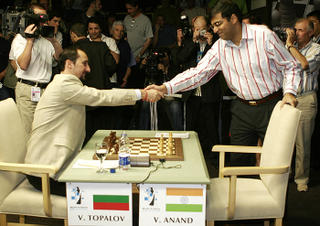
Atlast the World Chess Championship, San Luis 2005 series came to an end.
Indian Grandmaster Anand, Vishwanathan (2788) became the Vice-Champion of the series. Topalov, Veslin(2782) of Bulgaria became the Champion of 2005 World Chess Championship.
Anand, retained his second rank in the world rankings. His thurst of 1 one still remains unshakable. He always maintained his rank in world ranking as a northern star. Many have came and gone in 3rd rank in the world but Anand's rank never changed.
One more raival in the World for Anand, who came to 3rd ranking in the World is,Topalov. Others are Leko, Peter(2751) of Hungary and Ivanchuk, Vassily (2748) of Ukrain.
In th whole series Anand Vs Topalov had two matche and both mathces ended in draw. This also shows the tough game between the two Grandmasters.
Anand recently settled permanatly in Spain, because of his problem in attenending matches, which are mostly in Europe. Anand is said to be one of the worlds few rapid players. Anand mostly likes white pieces to play and his favorite opennings are Sisilian diffence and Ninzo-indian-Diffence,
The series Played Notation are available in following url.
http://www.fide.com/news.asp
Exact Playing file is available as a (PGN)
http://www.fide.com/tournaments
It is very informative when you analyze these games :). because Chess is the only game where you can recreate the played games.
Let us wish Anand all the best to his next series World Chess Cup Khanty-Mansiysk 2005 on 26 November 2005.-----------------------------------------------------------------------------------
14 October, 2005
Google Reader!!!

Are you searching for a RSS Reader? Or are you fed up with your old RSS reader ?
Then only one question you need to answer!
Do you have Google Account? If yes. Yes you got a wonderful RSS reader ‘Online’.
Just log on to http://www.google.com/reader
Really a easy to use tool.
Have fun
-----------------------------------------------------------------------------------
12 October, 2005
Mahathma Gandhiji was a ....
| "Generations to come will scarce believe that such a one as [Gandhi] ever in flesh and blood walked upon this earth." -- Albert Einstein | |
 Mahatma Gandhi at Darwen, Lancashire (England) | I have a doubt for long time. So I use my blog as a media to discover about it. Yes this may be a complex question. Hence let me take this to my readers and discus about this.
|
Nice Articel in Chandra's Blog
-----------------------------------------------------------------------------------
11 October, 2005
Big B turns 64

Hindi cinema's Evergreen super star Big B become 64 on October 11.
Amithabh Bachchan (Oct 11, 1942) Allahabad, was born in a poetic family. His father Harivanshrai was a great poet, who wrote a great poem 'Madhushala'. His mother is Taji Bachchan.
He studied at Boys High School in Aallahabad followed by Sherwood College in Nainital and went to Delhi University to earn his degree in science.
He started his career from the film Saat Hindustani (1969).But it was not a big hit. The real turn in his film career took place after 4 years from the movie 'Abhimaan' and Zanjeer. From that period onwards, his character and performance become a gigantic display of real hero in Hindi cinema.
Some of his box office hits are;
Sholay
Amar Akbar Anohony
Trishul
Don
Deewar
While shooting for the film Coolie (1983), he was badly injured in an on-set accident. He was rushed to a hospital in critical condition. The whole film industry waited out side the hospital and prayed for his recovery.
BBC conducted an online poll in 1999 and he was chosen “The Superstar of the Millennium” In June, 2000. He became the first living Asian to have a wax statue erected in his honour at Madame Tussaud's museum.
In 2000, he was chosen as the host for a new Indian game show, Kaun Banega Crorepati, the Indian version of Who Wants to Be a Millionaire?. Amitabh was a suave, assured host and the show was an enormous hit. Critics finally admitted that Amitabh still had box-office magic.
Since his game show success, he has appeared in several hit movies, most notably Baghbaan, Kabhi Khushi Kabhie Gham, Waqt, Black, Sarkar, and Viruddh.
An Amitabh film retrospective was held between April 8 and April 19, 2005 at the Lincoln Center in New York. The retrospective featured films starring Bachchan including Hrishikesh Mukherjee's Anand and Abhimaan and Sanjay Bhansali's Black. Amitabh was there for the plaudits; he also took this opportunity to appear on a number of television talk shows.
After the success of Zanjeer and Abhimaan, Amitabh Bachchan married actress Jaya Bhaduri in 1973. He has co-starred with Jaya in many films: Zanjeer, Abhimaan, Sholay, Silsila and, Kabhi Khushi Kabhi Gham. The marriage produced two children: Shweta Bachchan Nanda (b. 1974) and Abhishek Bachchan (b. 1976). Abhishek Bachchan has already followed his father's footsteps, having starred in a number of recent movies.
Long Live Our Big B
-----------------------------------------------------------------------------------
07 October, 2005
Indian on Time Magazine
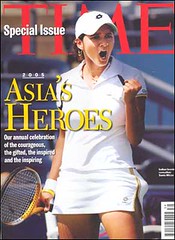
Indian on Time
Originally uploaded by Rajesh Photos.
Image Courtesy : Time Magazine
Time describes her as a role model for women in India and the fastest raising star in the sport this year. Published on Monday this week.
Sania in 2003 Wimbledon junior doubles champion she beat several top players and become the first Indian to reach third round of Australian open and the pre-quarter-finalist in US open
Hope, her quest to conquer to win a Grand slam will be a reality very soon.
-----------------------------------------------------------------------------------
06 October, 2005
The Argumentative Indian
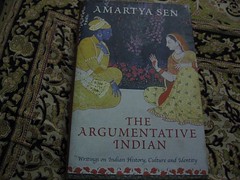
The Argumentative Indian
Originally uploaded by Rajesh Photos.
embalmed and treasured up on purpose to a life beyond life.
--John Milton
The new book of Prof. Amartya Sen, The Argumentative Indian (2005) is a wonderful book on Indian history and culture.
Prof Amartya Sen is the Nobel Prize winner in 1998 “for his contributions to welfare economics".
http://nobelprize.org/economics/laureates/1998/
I first saw a program in NDTV entitled, "India Questions Amartya Sen", anchored by Prenob Roy. The anchor displayed Prof. Sen's new book during the programme. I was not curious to buy the book at that time. Somehow, I bought the book and I should tell you, it is really a great book. I never expected that Prof. Sen, who was Indian born, lived in England for a long period of time, would have such a deep knowledge about Indian history to write a book of this caliber.
The Argumentative Indian is a collection of many essays of Prof. Sen, published in various magazines. In this book, Prof. Sen focuses on many aspects of Indians argumentative tradition. Not only does this book deals with the argumentative nature of Indians but also variuos current affairs of Indian argumentative topics.
Some of the notable topics are;
The Argumentative Indian; He took evidences from the past, to prove that, Indians have a traditional background of argumentative nature not as a negative but as a positive nature.
Tagore and His India; Prof Sen was born at Santiniketan, and a student of the University established by the poet Rabindranath Tagore. He has a very good knowledge on Tagore's life. In this topic, he explains in detail the special relationship between Tagore and his contemporary Mahatma Gandhi, their views on various topics and the drawbacks between them.
China and India; This topic displays his deep knowledge on Indian history. Here Prof. Sen explains how Buddhism migrated into ancient India. The history of Indo-China Relationship. Chinese contact with Nalanda University.
Tryst with Destiny; Jawaharlal Nehru's speech given on 15-Aug-1947, focusing on the world and the Indian situation.
India and the Bomb; You heard it right! An article on Indo-Pak Nuclear issues.
In addition, many more articles, which are very interesting and informative.
Reviews:
"India, going back for generations, has offered us masterful political, philosophic and economic commentary. That grace endures, and Amartya Sen is now its leading contributor. Nothing, whether from India or from the world at large, could surpass the essays in The Argumentative Indian. As will many others, I endorse this book for all." --John Kenneth Galbraith
"Mr. Sen's interests...extend far beyond the work that won him the Nobel...The 16 chapters range from an appreciation of Rabindranath Tagore, a great poet of Mr. Sen's native Bengal, to an examination of the historic intellectual links between India and China, to a discussion of India's wealth of sophisticated calendars... Mr. Sen shows that the argumentative gene is not just a part of India's make-up that cannot be wished away. It is an essential part of its survival – and an advantage."--The Economist
"Sen is unquestionably one of the most distinguished minds of our time . . . Yet while the pieces here are, as one would expect, enjoyably erudite and full of intriguing insights, they are not written in academies...Instead, the book is formed from a series of elegantly written historical and philosophical essays which cohere to form a single argument: that the sheer diversity of views and faiths and competing ideas that have always coexisted in India has naturally led to a fecund and tolerant argumentative tradition.
… Profound and stimulating . . . erudite and sophisticated . . . engaging and thought-provoking. The product of such a great mind at the peak of its power, it is one of the most stimulating books about India to be written for years, and it deserves the widest possible readership." --William Dalrymple, The Sunday Times (London)
"EP Thompson once wrote that since 'all the convergent influences of the world'...run through India, 'there is not a thought that is being thought in the west or east that is not active in some Indian mind'...It is certainly rare to see them as elegantly synthesised as they are in the cosmopolitan mind of Amartya Sen...His prose is benignly professorial, always measured, and occasionally rises to dry irony...He wants to see how the argumentative tradition in India can be deployed against 'societal inequity and asymmetry' and what actual use can be 'made of the opportunities of democratic articulation and of political engagement'...'Silence is a powerful enemy of social justice,' Sen writes."--Pankaj Mishra, The Guardian
I wish every one to read this wonderful and informative book. I appreciate, if you buy and read the original version of the book, rather than second hand books or pirated versions, so that you are recognizing the author’s real hard work and effort gone into making of this great book.
-----------------------------------------------------------------------------------
03 October, 2005
My Classical Guitar Tabs
Classical guitar provides same music like piano, a melody line and a bass. There are many similarities between Piano and Classical guitar. One main and interesting similarity is the Score or the musical writing, Piano has, as I said two tracks of melody and bass. Score of Classical guitar, merges the both into one link but the player knows the difference and he plays similar music.
About my Music School:
3B School of Music; 3B is the short form of calling three great composers of western music they are Johann Sebastian Bach, Ludwig van Beethoven and Johannes Brahms. The school is situated in Southern Chennai, Tamil Nadu, India. 3B School of Music, teaches western instruments like Guitar, Classical Guitar, Keyboard, and Violin with Indian instruments like Mridangam, tabla and also dance and vocal.
Basic Notes:
Music, Human's greatest discovery, without having link with various parts of the world, all types of musical scale has seven notes! It is not a discovery that one or a group of people sat and framed the seven scales. Individually in many parts of the world, separately invented this art. However, all follow the same seven notes. Only difference is, how the seven notes are read.
In India the origin of Solfege is found in Vedic texts like Upanishads, It sounds like Sa, Re, Ga, Ma, Pa, Dha, Ne. Some other places it is directly used as English alphabets C, D, E, F, G, A, B. Other places as Do, Re, Mi, Fa, Sol, La, Ti. and so on,
Web Resources;
I found a web site on the net, a wonderful resource for learning. The Classical Guitar Tab [ http://www.classtab.org] site. It is an archive of many composers of all time. I too had the opportunity to contribute in that site, which I would like to share with you. It is like an ocean of archives comprising composers from many countries. Some of my contributions in the site are:
Edward Hagerup Grieg (1843-1907)
Op 46 - Peer Gynt, Suite No 1 - Morning Mood - MIDI - [easy]
Jean Paul Martini (1741 - 1816)
Plaisir d' Amour - MIDI - [easy]
anonymous / traditional
Incomparable - MIDI - [easy]
Above Transcriptions are also available in http://www.ultimate-guitar.com site.
Incomparable
Morning Mood
more to come in future :)
An easy way to memorize the Seven notes is nicely written in one lyric in the movie,
"The Sound of Music" .
Doe, a deer, a female deer.
Ray, a drop of golden sun.
Me, a name I call myself.
Far, a long, long way to run.
Sew, a needle pulling thread,
La, a note to follow sew,
Tea, a drink with jam and bread!
That will bring us back to do oh-oh-oh!
So, do, la, fa, me, do, re.
So, do, la, ti, do, re, do.
When you know the notes to sing,
You can sing most anything!
Doe, a deer, a female deer.
Ray, a drop of golden sun.
Me, a name I call myself.
Far, a long, long way to run.
Sew, a needle pulling thread,
La, a note to follow sew,
Tea, a drink with jam and bread!
That will bring us back to do oh-oh-oh!
Do, re, mi, fa, so, la, ti, do
Do, si, la, so, fa, mi, re,
Do-mi-mi-mi-so-so-re-fa-fa-la-ti-ti
Do-mi-mi-mi-so-so-re-fa-fa-la-ti-ti
When you know the notes to sing
You can sing most anything
Doe, a deer, a female deer.
Ray, a drop of golden sun.
Me, a name I call myself.
Far, a long, long way to run.
Sew, a needle pulling thread,
La, a note to follow sew,
Tea, a drink with jam and bread!
That will bring us back to do oh-oh-oh!
Do, re, mi, fa, so, la, ti, do
So, do, la, fa...
Ti, doooooo...
So, do!
01 October, 2005
A Man And His Path
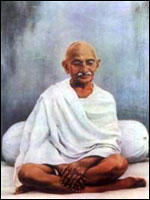
Gandhi's principle of satyagraha (from Sanskrit, satya: truth, and graha: grasp/hold).Whenever I read his books, Autobiography and other related material, I used to scribble his great quotations in my personal book and with great difficulty I have to shortlist them to ten, which are like my 10 commandments.
Quotes of Gandhi:
1) The only virtue I want to claim is truth and non-violence. I lay no claim to superhuman powers. I want none. I wear the same corruptible flesh that the weakest of my fellow beings wears, and am therefore as liable to err as any. My services have many limitations, but God has up to now blessed them in spite of the imperfections
2) I am but a poor struggling soul yearning to be wholly good, wholly truthful and wholly non-violent in thought, word and deed, but ever failing to reach the ideal which I know to be true. It is a painful climb, but the pain of it is a positive pleasure to me. Each step upwards makes me feel stronger and fit for the next.
3) However much I may sympathise with and admire worthy motives, I am an uncompromising opponent of violent methods even to serve the noblest of causes
4) I claim to be a simple individual liable to err like any other fellow mortal. I own, however, that I have humility enough to confess my errors and to retrace my steps
5) An ounce of practice is worth more then tons of preaching. Intellect takes us along in the battle of life to a certain limit, but at the crucial moment it fails us. Faith transcends reason. It is when the horizon is the darkest and human reason is beaten down to the ground that faith shines brightest and comes to our rescue
6) A principle is the expression of perfection, and as imperfect beings like us cannot practice perfection, we devise every moment limits of its compromise in practice
7) A True soldier does not argue as he marches, how success is going to be ultimately achieved. But he is confident that if he only plays his humble part well, somehow or other the battle will be won. It is in that spirit that every one of us should act. It is not given to us to know the future. But it is given to everyone of us to know how to do our own part well.
8) There will have to be rigid and iron discipline before we achieve anything great and enduring, and that discipline will not come by mere academic argument and appeal to reason and logic. Discipline is learnt in the school of adversity
9) There is no human institution but has its dangers. The greater the institution, the greater the chances of abuse. Democracy is a great institution and therefore it is liable to be greatly abused. The remedy therefore is not avoidance of democracy but reduction of the possibility of abuse to a minimum.
10) It is good to see ourselves as others see us. Try as we may. We are never able to know ourselves fully as we are, especially the evil side of us. This we can do only if we are not angry with our critics but will take in good heart whatever they might have to say
Gandhiji had a great vision and foresaw the threats to Democracy, human weaknesses and gave suggestive measures to safeguard our democratic values in simple quotes.What is agonizing in today’s world is that we are in the path of slowly forgetting the great vision of Gadhiji and we are habituating to remember him only on October 2nd. It’s a great mistake and unfortunate happening.
Our President Dr Abdul Kalam Said, “India has knowledge, natural resources; what we need is planned integrated missions to achieve the target in a time bound manner. Let us all work for self-sufficient environment friendly energy independence for the nation”.
-----------------------------------------------------------------------------------

About me
- I'm Rajmahendra
- From Chennai, TN, India
I have started my own Website....
from now please start visiting my personal blog @ http://www.rajmahendra.com
Subscribe for the Feed..
from now please start visiting my personal blog @ http://www.rajmahendra.com
Subscribe for the Feed..
Last posts
- Link to call me for free
- Paul Mauriat - Love Is Blue
- The oldest game! Go / Weiqi / Baduk
- Chess Rank Titles
- how do you handle adversity? Are you a carrot, an ...
- Edelweiss - The Plant and The Song
- Happy Diwali - Festival of light
- Mozilla firefox Party
- Welcome to India ! India is heaven !!
- BIHAR DRIVING LICENSE APPLIKASON PHOROM
Chess Sites
- Online Chess at www.ChessHere.com
- Modern Defense
- 64Squares Chess Academy
Archives
BlogCamp

Search
Sponsor
BLOG Rolls
Powered by


Best Viewed In

Technorati Profile

My blog is worth
$3,951.78.
How much is your blog worth?
Blogroll Me!
![]()

Who Links Here





![]()


![]()
![]()
